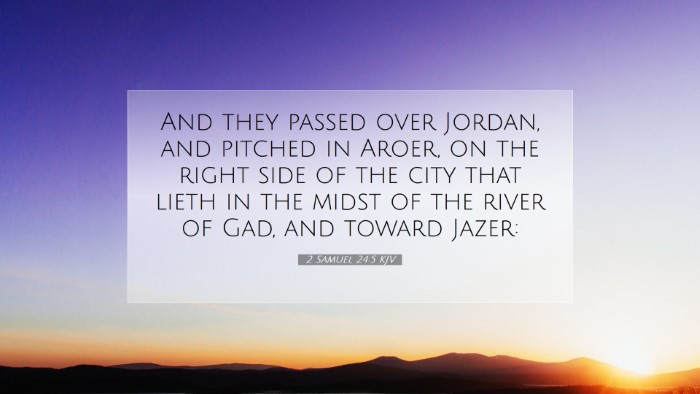Commentary on 2 Samuel 24:5
Scripture Reference: 2 Samuel 24:5 - "And they passed over Jordan, and pitched in Aroer, on the right side of the city that is in the midst of the river of Gad, and toward Jazer."
Introduction
The verse serves as a pivotal moment in the narrative of David's reign, particularly in the context of the census taken that leads to God's judgment on Israel. This commentary synthesizes insights from various public domain commentaries to explore the geographical, historical, and theological implications of this passage.
Geographical Context
As noted by Matthew Henry, the mention of Aroer signifies a strategic location in the region of Gad. Its positioning on the banks of the Jordan River underscores the importance of waterways in ancient Israel. Aroer served not only as a military encampment but also symbolized the boundary territories that David's military forces could traverse.
Albert Barnes further elucidates that Jazer, being close to Aroer, was a significant city in the territory of the tribe of Gad. This proximity indicates a military or administrative strategy in which David aimed to assess his forces against potential threats from neighboring regions. The choice of this location was likely due to its defensible geography that reinforced David's authoritative position.
Theological Implications
The act of passing over Jordan represents a transition that is rich in biblical symbolism. Adam Clarke highlights that the crossing of the Jordan is reminiscent of Israel's entrance into the Promised Land, suggesting themes of covenant, leadership, and divine direction. Here David is portrayed in a phase of self-reliance, which ultimately leads him to a sinful act of conducting a census, stepping into territory that tempts God's wrath.
Divine Judgment and Mercy
This passage directly connects with the broader narrative of David's life and his complex relationship with God. Reflecting on this text, it becomes evident that God's judgment is not merely punitive; it serves as a means of spiritual correction. Matthew Henry suggests that the initial thought of the census stems from pride or a lack of trust in God’s provision. Therefore, in assessing this historical moment, one notes that God allows David to proceed, yet follows with consequences that bring attention back to the need for reliance on divine grace.
Lessons on Leadership
Pastors and theologians may draw on this passage to exemplify the qualities of godly leadership. David’s decision—though seemingly justifiable from a military standpoint—lacks spiritual discernment. Leadership, as indicated in this text, must involve a constant dependency on God’s guidance. Sermons based on this verse can delve into the themes of humility and seeking God’s face before making significant decisions.
Commentary Synthesis
1. Matthew Henry emphasizes the need for leaders to seek God's will, cautioning against self-sufficiency. The consequences that follow the census remind believers of the danger in counting on human strength alone.
2. Albert Barnes points out the military and political implications of the passage, urging the reader to understand how the theme of rebellion against God’s provision played a role in David’s life, ultimately leading to the ensuing judgment.
3. Adam Clarke offers insights into the grace that underlies the judgment, showcasing God’s desire for repentance over retribution. This highlights a narrative of restoration, inviting readers to consider how they might return to God after their own missteps.
Conclusion
In conclusion, 2 Samuel 24:5 provides a profound reflection on the nature of leadership, the consequences of straying from God’s path, and the grace that awaits those who seek to return. It alerts modern readers of Holy Scripture, particularly pastors and theologians, to the essential role of humility and divine guidance in all aspects of life. As they preach and teach, understanding this historical context enriches their ability to apply these timeless truths to contemporary faith practices.
Reflection Questions
- What practices can a leader implement to ensure they seek God’s counsel in their decision-making?
- How does this verse speak to the contemporary issues of pride and self-reliance in leadership?
- What does it mean to find grace in the midst of judgment according to this passage?


